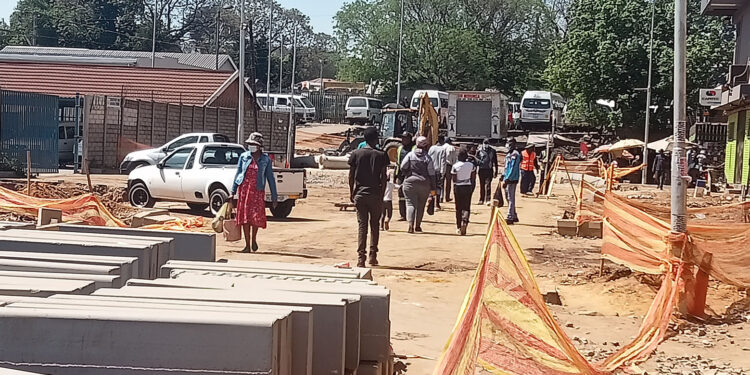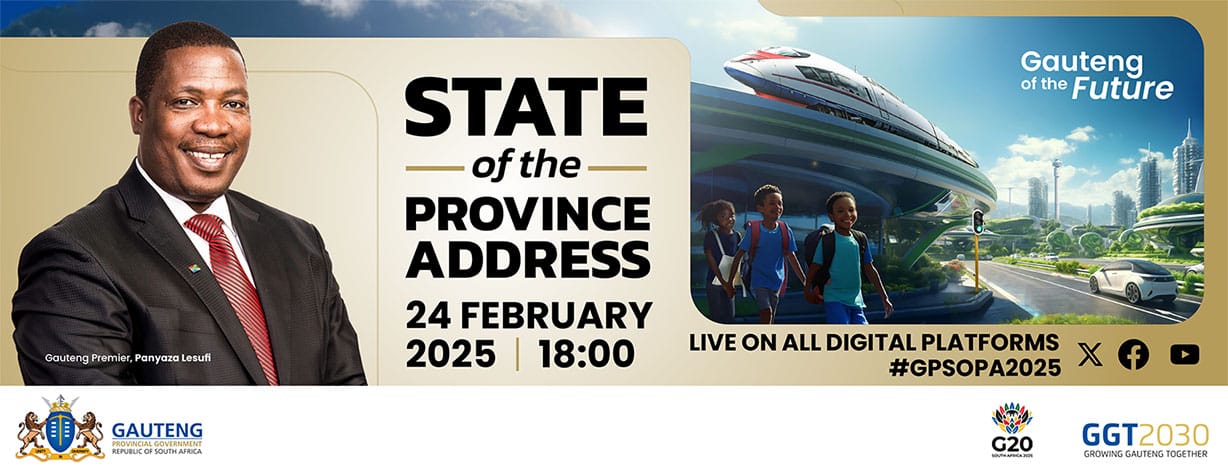On Sunday, 14 July 2024, the newly appointed Member of the Executive Committee (MEC) for Finance and Economic Development in the Gauteng Province, Mr Lebogang Maile, engaged with South African media on the state of the economy and finances of the province, as well as the key areas of focus for the current administration. The engagement with the media, which took place at the Gauteng Infrastructure Financing Agency (GIFA) in Johannesburg, was aimed at taking the people of Gauteng into confidence on the state of the provincial treasury and measures for economic development that are in place, as well as those that will be initiated, to facilitate the urgent and critical alleviation of challenges confronting the province.
Background: Gauteng’s critical economic indicators
Gauteng has the biggest provincial economy in South Africa and the fourth biggest economy in Africa. The Gross Domestic Product (GDP) of Gauteng currently stands at just over R2.4 trillion – accounting for almost 34 percent of the national GDP and more than 10% of the total GDP of the entire sub-Saharan region. This economy has tripled since 1994, when it stood at R710 billion. The Gauteng GDP per capita grew from R24 095 in 1994 to R126 547 in 2022. This has made it the province with the most taxpayers and the highest average taxable income per taxpayer, according to SARS. Employment in Gauteng grew from 3.4 million in 1994 to 5.06 million in 2022.
The population we serve
Despite being the smallest province in South Africa by land area, covering only 1.5% of the country’s total land area, Gauteng is the largest province by population size and population density. In 1994, the province had a total population of 7.6 million people. This population has doubled since then, standing at just over 15.1 million as of 2022 Census data. This is a quarter or 25% of the total population in South Africa. This population is largely concentrated in Ekurhuleni, Johannesburg and Tshwane. However, the largest population growth rates are in Tshwane, Lesedi, Emfuleni and Rand West municipalities. In 2022, an estimated 64.7% of all births in South Africa occurred in Gauteng. There is a sturdy increase in the number of people born in Gauteng and a corresponding steady decline in those born outside.
Key challenges facing the province
This provincial profile creates unique challenges for Gauteng, one of which is unemployment. Gauteng’s unemployment rate, at 33.7%, is higher than the national average of 32.9%. Based on its working-age population, 4 out 10 or 40% people entering the labour force in South Africa are in Gauteng. This is occurring in the context of a post-COVID economy that is yet to recover. Gauteng had the worst economic contraction of all provinces in 2020 – the impact of which continues to be felt across most industries. Particularly impacted is infrastructure maintenance
and development. Due to the pandemic, several infrastructure projects ran over the prescribed time of delivery, with significant cost overruns. Besides manufacturing, other industries that have not recovered post-COVID include construction, tourism, agriculture, retail and wholesale trade, and domestic services.
Migration is another key challenge facing the province. Since 1994, there has been an increase in the number of migrants across the African continent. In the SADC regions, most of the migrants are concentrated in South Africa, with the United Nations Department of Economic and Social Affairs estimating the total number to just over 3 million. Most of them are concentrated in Gauteng. Additionally, since 1994, Gauteng has experienced the greatest positive net migration, in line with the historical pattern of the province, experiences the greatest population increase in the country.
The department, recognising that the ongoing cost-of-living crisis is posing a significant constraint on households, is accelerating delivery of high impact projects with a specific focus on sectors with high labour absorption capacity. In order to deliver on this important mandate, the department will be collaborating with the private sector to resolve some of the structural mismatches in the economy. Key projects in this administration will include:
- Revenue collection. This priority is anchored around increase of the existing own revenue resources and modernisation of processes to increase efficiency, cost effectiveness, client satisfaction and eliminate loopholes in terms of collection mechanisms. Through financial and economic planning, and specifically, infrastructure development, the provincial government aims to generate revenue in order to ensure the provision of services and re-industrialisation efforts. Critical to this will be promoting compliance and leveraging public procurement to promote the township economy. Clear targets will be set for relevant officials and such targets will be reflected in the provincial budget in the next iteration of the Medium-Term Expenditure Framework.
- Intensification of efforts to finalise the establishment of a provincial state-bank. One of the key objectives of this bank will be investing in projects characterised by low private sector investment and high social return. A full business plan informed by a thorough business case is underway and will be completed by the end of this financial year.
- Taking measures to facilitate the provision of suitable infrastructure including worksites, social amenities, business information centres, and common usage facilities necessary for the development of township-base enterprises. In addition, the department will invest in the manufacturing capacity of township enterprises to minimise reliance on procuring goods from major retailers. The Special Economic Zones (SEZ) program, supported by intensive investment promotion, will be utilised to accelerate re- industrialisation of the Gauteng City Region. The department will continue to support investment in the automotive sector, with special attention given to electric vehicles and autonomous vehicles. Working with national counterparts, the department will double our forts in resolving the logistical constraints faced by the auto-sector. The Vaal SEZ we will support investment in the green economy sector. Agro-industrial investment in technology, capital equipment and financial solutions will also be important levers for the West Rand SEZ. Mineral beneficiation and financial technology will anchor both the OR Tambo SEZ and City of Johannesburg economic corridor. The Gauteng Growth and Development Agency (GGDA) will be tasked with coordinating all provincial departments to take stock of their contribution towards making these SEZ’s successful.
- Structural transformation of the regional economy in sectors like chemicals, Clothing, Textile, Leather and Footwear (CTLF), electronics, aerospace and construction will see us contribute to increased skills, technology, finance and infrastructure growth in marginalised areas. These areas should increase their economic output proportionally and participate in high value industries too. Linked to this, the department will establish a provincial government-owned pharmaceutical company that will prioritise the production of vaccines. A business case and business plan for this project will be done in this financial year.
- The face of our challenges is the youth, women and people with disabilities. As such, the department will increase its pace in improving the access of these social categories to development finance, artisanal skills, technology and economic infrastructure closest to their areas of residence. An urgent summit with non-governmental organisations (NGOs) and community-based organisations (CBOs) operating in these crucial areas of development will be convened in tandem with the relevant departments in the course of the next financial year.
Through these and other interventions, some of the more salient challenges confronting the provincial fiscus and the standard of living of Gauteng residents will be alleviated. Over the coming weeks, more plans in the pipeline for the Gauteng economy will be announced, in line with ensuring transparency and accountability to the residents of the province.
Gauteng Department of Economic Development
Soweto Sunrise News


































